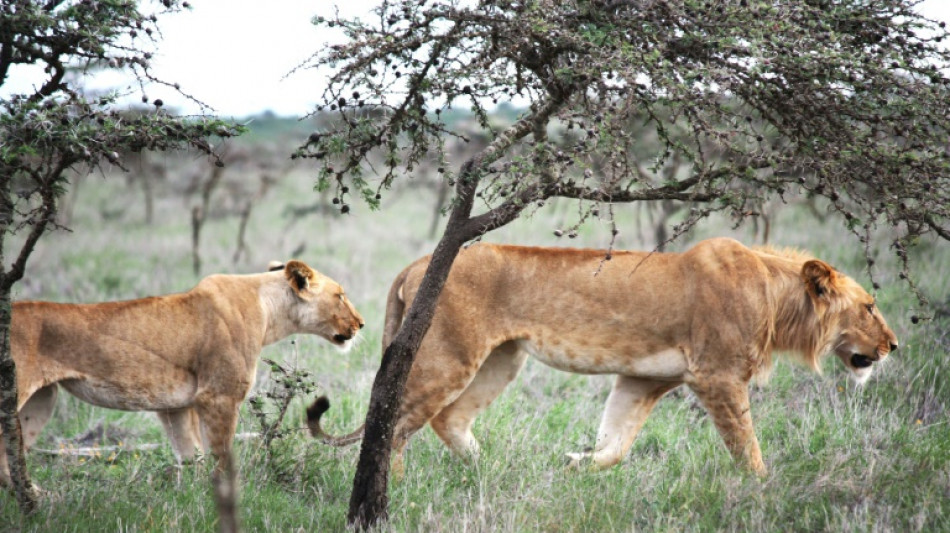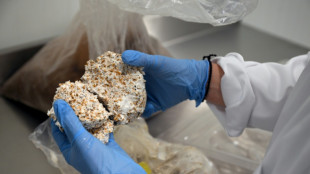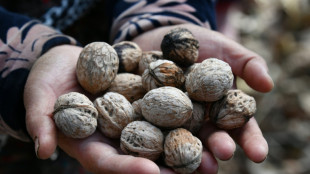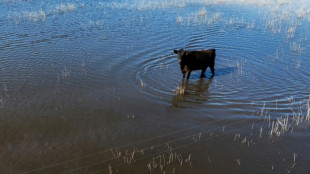
-
 Zanzibar women turn to sponge farming as oceans heat up
Zanzibar women turn to sponge farming as oceans heat up
-
Stocks rise with focus on Fed, tech as US government reopens

-
 Curry lifts Warriors over Spurs, Thunder rout Lakers, Jokic shines
Curry lifts Warriors over Spurs, Thunder rout Lakers, Jokic shines
-
Mushroom material takes on plastic packaging at Belgian start-up

-
 India's top tennis player says denied China visa
India's top tennis player says denied China visa
-
In Kyrgyzstan, world's largest natural walnut forest thins away

-
 TV soaps and diplomacy as Bangladesh and Turkey grow closer
TV soaps and diplomacy as Bangladesh and Turkey grow closer
-
Striking Boeing defense workers to vote on latest contract

-
 Australia's opposition ditches commitment to net zero emissions
Australia's opposition ditches commitment to net zero emissions
-
Duffy takes four as New Zealand crush West Indies to seal T20 series

-
 South Korea halts flights for college entry exam
South Korea halts flights for college entry exam
-
Trump signs bill to end record-breaking US shutdown

-
 EU lawmakers to vote on unpicking green business rules
EU lawmakers to vote on unpicking green business rules
-
Smith says England speed kings could struggle in Ashes

-
 Stocks stutter with focus on Fed, tech after US reopen vote
Stocks stutter with focus on Fed, tech after US reopen vote
-
Record-breaking US shutdown ends as political fallout begins

-
 France marks decade since harrowing Paris attacks
France marks decade since harrowing Paris attacks
-
Skubal, Skenes win MLB Cy Young Awards for top pitchers

-
 Record rains turn Argentina's farm-filled Pampas plains to wetlands
Record rains turn Argentina's farm-filled Pampas plains to wetlands
-
Solar storm brings new chance of vivid auroras, signal disruptions

-
 Gauff and Fritz back for United Cup against Swiatek's Poland
Gauff and Fritz back for United Cup against Swiatek's Poland
-
World's fossil fuel emissions to hit new record in 2025: study

-
 BMS Holdings Berhad Sets To Raise RM80.08 Million From Ace Market IPO Exercise
BMS Holdings Berhad Sets To Raise RM80.08 Million From Ace Market IPO Exercise
-
Empire Metals Limited Announces Appointment of Joint Corporate Broker

-
 US jury: Boeing owes $28 mn to family of Ethiopian Airlines crash victim
US jury: Boeing owes $28 mn to family of Ethiopian Airlines crash victim
-
G7 calls for urgent Ukraine ceasefire, de-escalation in Sudan

-
 Bayern stun Arsenal, Man Utd sink PSG in Women's Champions League
Bayern stun Arsenal, Man Utd sink PSG in Women's Champions League
-
New Epstein emails claim Trump 'knew about the girls'

-
 Brazil tribal chief ready to give Lula a 'talking-to'
Brazil tribal chief ready to give Lula a 'talking-to'
-
Clippers' Beal to have season-ending surgery - report

-
 Dow ends at record on hopes US government will reopen
Dow ends at record on hopes US government will reopen
-
Portugal's Ronaldo hoping Ireland fans boo him

-
 England set for Etihad start to Euro 2028 tournament campaign
England set for Etihad start to Euro 2028 tournament campaign
-
Sinner cruises past Zverev and into last four of ATP Finals

-
 US presses final penny after more than 230 years
US presses final penny after more than 230 years
-
Baxter says England must be 'selfless' to see off All Blacks

-
 Pardoned French-Algerian writer Sansal arrives in Germany
Pardoned French-Algerian writer Sansal arrives in Germany
-
Bayern battle back to shock Arsenal in Women's Champions League

-
 China hopes US will 'some day' return to climate fold, official tells AFP
China hopes US will 'some day' return to climate fold, official tells AFP
-
Trump 'knew about the girls,' new Epstein emails claim

-
 Scotland 'optimistic' Russell will be fit to face Argentina
Scotland 'optimistic' Russell will be fit to face Argentina
-
Big platforms chart gradual path to self-driving at Web Summit

-
 Jane Goodall honored in Washington by conservationists including DiCaprio
Jane Goodall honored in Washington by conservationists including DiCaprio
-
Tuberculosis killed 1.23 million last year: WHO

-
 New Zealand coach Robertson says Twickenham visit is 'why I'm doing the job'
New Zealand coach Robertson says Twickenham visit is 'why I'm doing the job'
-
Hopes of US shutdown deal fail to sustain market rally

-
 US military personnel do not risk prosecution for drug strikes: Justice Dept
US military personnel do not risk prosecution for drug strikes: Justice Dept
-
Jailed writer Sansal on way to Germany after Algeria pardon

-
 Ukraine ministers resign over major corruption scandals
Ukraine ministers resign over major corruption scandals
-
Record-breaking US shutdown to end as political fallout begins


How an invasive ant caused lions to change their diet
You may have heard of the "butterfly effect", but how about the "ant effect"?
Research published Thursday has shown how an ant muscled into a Kenyan savannah and sparked such a dramatic transformation in the landscape that even the local lions changed the way they hunt.
The study highlights the potentially profound impacts of invasive species, which are spreading at an increasing rate as human activities give animals, insects and plants opportunities to hitchhike into new territories.
"Oftentimes, we find it's the little things that rule the world," said Todd Palmer, an ecologist from the University of Florida, who was part of the research team that traced the implications of the big-headed ant on the hunting habits of lions in central Kenya.
"These tiny invasive ants showed up maybe 15 years ago, and none of us noticed because they aren't aggressive toward big critters, including people. We now see they are transforming landscapes in very subtle ways but with devastating effects," Palmer said.
It all starts with the whistling-thorn acacia trees in the plains of Laikipia, Kenya.
These thorny trees had developed a mutually beneficial relationship with the local acacia ant: The trees provide shelter and food for the ants and in return they use their stinging bite to discourage hungry elephants from devouring the trees.
But the big-headed ant changed all that.
Thought to have originated on an island in the Indian Ocean and brought to the area by the movement of people and goods, these invasive marauders arrived around two decades ago and started killing the acacia ants, leaving the whistling-thorn trees vulnerable to herbivores.
Diminished tree cover poses a problem for lions because they rely on the element of surprise to ambush their prey, notably zebras.
Researchers spent three years in Kenya's Ol Pejeta Conservancy tracking the lions' movements with GPS collars to see how they responded in the areas colonised by the invasive ants.
Their study, published in the journal Science, found that the big-headed ants had led to a threefold decline in zebra killings.
But the researchers were surprised to find that this did not cause the lion population to decline -- good news because lion populations in the region have already shrunk to around 2,000 individuals from an estimated 100,000.
Instead, the big cats switched dining preference and strategy -- ganging up in larger groups to go after buffalo, said Douglas Kamaru of the University of Wyoming, lead author of the study.
- 'Profound switch' -
While the lions have adapted thus far, the big-headed ants could spell trouble for other species that rely on the whistling-thorn tree, like giraffes or the critically endangered black rhino.
"The question is what happens going forward," Kamaru told AFP.
And the lions' changing diet may provoke its own cascade of impacts.
"We don't yet know what could result from this profound switch in the lions' hunting strategy," Palmer said.
Last year the intergovernmental science advisory panel for the UN Convention on Biodiversity (IPBES) catalogued more than 37,000 so-called alien species that have taken root -- often literally -- far from their places of origin.
That number is trending sharply upward, along with the bill for the damage, estimated at well over $400 billion a year.
F.Pedersen--AMWN

